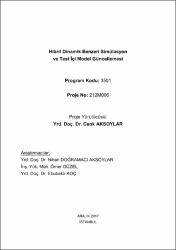Hibrit Dinamik Benzeri Simülasyon ve Test İçi Model Güncellemesi
Citation
AKSOYLAR, Cenk, Nihan Doğramacı AKSOYLAR, Ömer GÜZEL & Ebubekir KOÇ. "Hibrit Dinamik Benzeri Simülasyon ve Test İçi Model Güncellemesi." Aralık, İstanbul 2017.Abstract
Yapıların deprem davranışlarının belirlenmesinde kullanılan laboratuvar testleri; quasi statik,
dinamik benzeri ve sarsma tablası testleri olarak gruplandırılabilir. Dinamik benzeri
yöntemlerine ait araştırmalar; hibrit, coğrafik olarak hibrit, sürekli ve gerçek zamanlı gibi
dallarda yoğun olarak sürmektedir. Hibrit dinamik benzeri simülasyonda, araştırılacak yapı,
altyapı parçalarına bölünür. Bu altyapılardan deprem davranışı iyi bilinen, elastik sınırlarda
davranan veya geometrik boyutları büyük olanlar matematiksel olarak modellenir. Deprem
davranışları asıl araştırma konusu olan altyapılar ise laboratuvarda fiziksel olarak test
edilirler. Hibrit dinamik benzeri simülasyonun en önemli dezavantajı, deprem davranışı
incelenmek istenilen altyapının tüm yapıda çok tekrar ettiği durumlarda ortaya çıkmaktadır.
Test içi model güncellemeli hibrit dinamik benzeri deneyin amacı, hibrit simülasyonda fiziksel
test edilen altyapıdan elde edilen sonuçlara göre matematiksel olarak modellenen
altyapılarda kullanılan parametrelerin test esnasında güncellemesini yapmaktır.Bu çalışmada hibrit dinamik benzeri simülasyonda test içi model güncellemesi için yeni bir
yöntem önerilmiş ve etkinliği incelenmiştir. Geliştirilen iterasyonsuz yöntem kesit seviyesinde
bir model güncelleme yöntemi olup, genişletilmiş Masing modelli dönme yayları
kullanmaktadır. Ayrıca quasi statik, dinamik benzeri, hibrit dinamik benzeri ve test içi model
güncellemeli hibrit dinamik benzeri deney yöntemlerinde parametrik deneysel çalışmalar
yapılarak, yöntemlerin etkinliği ve parametrelerin sonuçlara olan etkisi araştırılmıştır.
Yapılan parametrik incelemelerde; deney tekrarlanabilirliği, monotonik ve çevrimsel yükleme,
zaman adım aralığ, sönüm, yükleme hızı, başlangıç rijitliği, alfa katsayısı, tekrarlanan sayısal
altyapı sayısı, ayak uzunluğu, deprem kaydı vb. etkiler incelenmiştir. Ayrıca üç farklı dinamik
yükleme tipi; i) anlık sabit yük, ii) sinüzoidal yük ve iii) deprem kaydı göz önüne alınmıştır.Sonuç olarak, kurulan hibrit dinamik benzeri deney sisteminin beklenilen hassasiyette ve
doğrulukta çalıştığı gösterilmiştir. Ayrıca önerilen genelleştirilmiş Masing modelli test içi
model güncelleme yaklaşımının da hibrit dinamik benzeri deney yöntemini geliştirdiği ve elde
edilen sonuçları gerçek duruma yaklaştırdığı gösterilmiştir. Oluşturulan sistem farklı model
güncelleme alternatiflerinin incelenmesi için de uygundur. Ayrıca kurulumu tamamlanan
altyapı ile coğrafik olarak dağınık hibrit dinamik benzeri deneyler de gerçekleştirilebilir. Experimental tests for determining the seismic behavior of structures can classified under
three main types: i) shake table tests, ii) quasi-static tests and iii) pseudo dynamic tests.
Researches about pseudo-dynamic test methods are continuing especially on hybrid
simulation, distributed hybrid simulation, continuous simulation and real time simulation
subjects. The idea behind the hybrid pseudo-dynamic simulation is to divide the investigated
structure into substructures. Among these substructures, the ones which the seismic
behavior is well known, remain in the elastic limits or not suitable for physical tests due to
their geometrical dimensions are numerically modeled. On the other hand, the ones whose
seismic behavior is the main focus of the investigation and the ones in which the nonlinear
behavior is more governing are physically tested. However the most important disadvantage
of the hybrid pseudo-dynamic simulation occurs when the physically investigated
substructure repeats multiple times in the whole structure.The purpose of the online model updating in hybrid pseudo dynamic test is to update the
parameters in numerically modeled substructures according to the results obtained from
physically tested substructures during the hybrid simulation.
In this study, a new online model updating method for hybrid pseudo dynamic test is
proposed and the effectiveness is investigated. The developed non–iterative model updating
method uses extended Masing models for rotational springs. Also parametric experimental
studies have been conducted to investigate the effects of the parameters on the results and
the effectiveness of quasi static, pseudo dynamic, hybrid pseudo dynamic and online model
updating in hybrid pseudo dynamic test methods.In parametric studies; test reproducibility, monotonic and cyclic loading profile, time step
interval, damping, loading frequency, initial stiffness, alpha coefficient, number of repeated
numerical substructure, column (pier) height, ground motion record etc. effects are
investigated. Also three different load types; i) instantaneous constant load, ii) sinusoidal
load, and iii) earthquake load are considered.
As a result it is demonstrated that, the established hybrid pseudo dynamic test system works
within expected accuracy and effectiveness. Also it is showed that the proposed online
model updating method with extended Masing model enhance the hybrid pseudo dynamic
test results and bring closer the obtained solutions to the real solutions. The system is also
ready for investigating different online model updating procedures. Furthermore it is possible
to conduct distributed hybrid pseudo dynamic test with the current system.



















